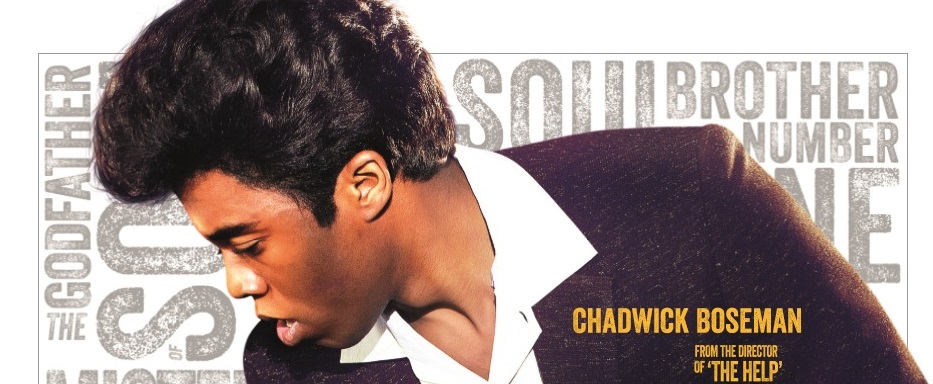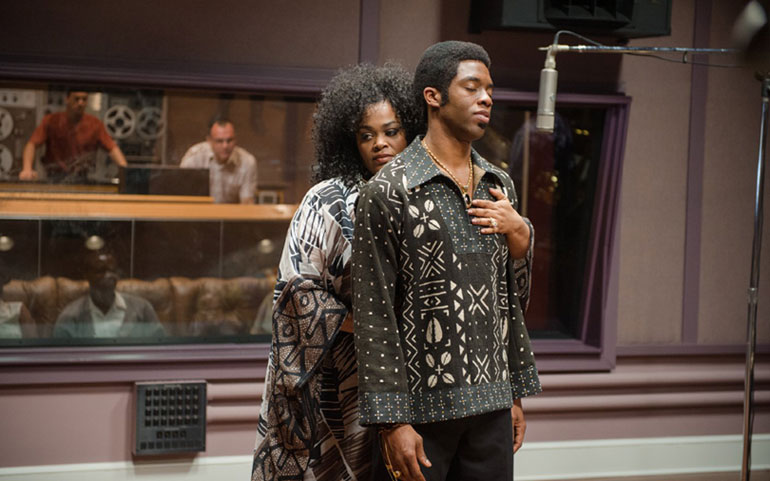Despite the brilliance of the soundtrack and Chadwick Boseman, the script is not singing to the same outstanding tune.

This is a mans world, and it would be nothing without James Brown– apparently. With his rose coloured suit, perfectly quaffed hair and ankle-swinging flares, Chadwick Boseman arrives on screen as The Godfather or Soul, the funkiest man in town, Mr. James Brown. Sauntering down an echoing hallway, the distant sound of hundreds of screaming fans, Get On Up starts as a pumped up, celebration of one of the biggest soul singers in history. What came to follow is 138 minutes of salacious performances and a riveting soundtrack of funky hits, all crammed in to a disappointing and jarring narrative. Although GET ON UP desperately and bravely tries to seduce its audience into an emotional tale of fame and woe, it falls short at moderate drama and lackluster emotions.
The pacing of this film is truly what lets it down the most. Directed by Tate Taylor, who gained fabulous success with the gut wrenching The Help and Winter’s Bone, tells the story of James Brown – from his turbulent childhood, solo success and family turmoil all the way to one of his latest performances. Told in a non-chronological narrative, throwing flashback and flash-forward in at random, often within the space of mere minutes of each other, GET ON UP loses audiences’ quicker than expected, due to this style of story telling.
Although this narrative style is often popular within this biopic genre and often leads great success, the issue with Taylor’s version is that the sections of Brown’s life are thrown together in a seemingly careless way. Although some of the scenes do in fact correlate, the majority of them are mixed in a way that makes little sense, ensuring the narrative goes stale, like that mid-morning cup of coffee you always forget about.
Due to this fatal error in narrative style, it’s particularly difficult for the audience to emotionally connect with Brown and his gaggle of friends/band mates. This is especially poignant with the childhood section of the film, in which Brown’s difficult family life is shown in brutal honesty. It is difficult to engage in this part of Brown’s life, even though it should be the part in which you feel most, due to the constant cutting away to view the singer in a far less empathetic state. This lets down the impressive way in which the story is actually filmed. With it’s varied range of camera styles, GET ON UP enables audiences to feel both part of the James Brown gang as well as one of his many adoring fans. Should the non-chronological order of the story had matched the sophisticated style of filming, one might have felt more emotionally involved in the turmoils these characters faced.
Despite these flaws, as Brown, Chadwick Boseman is absolutely electric. In this role, Boseman is able to bloom in a full range of emotions. Whether it’s his bang-on dance moves, storming stage presence or torturous temper, Boseman takes on Brown’s persona with commitment and flare.
During the narrative, audiences see’s Brown from his stint in the jail as a young adolescent, his performance in Vietnam, his roaring success as part of The Flames band as well as his days as a tyrant of perfection, an abusive husband and a grieving father. Boseman plays each part with a level of dedication and finesse that is genuinely tantalizing. Should the script, by British brothers Jez and John-Henry Butterworth, given him a chance to show as much emotion as he does in the scene between him and his estranged mother (Viola Davis), his performance would have no doubt gained that emotional attachment audiences may fail to have.
Alongside Boseman was Nelsan Ellis (True Blood) who played Bobby Byrd, Brown’s best friend and fellow band member. Ellis gives a wonderful performance as the greatly put upon best friend of Brown and it’s through this character that the audiences are privy to the control freak James Brown appears to be. With last minute rehearsals, docking their pay, forcing them to agree with everything he said and basically just being the world worst boss, as Byrd, Ellis plays a brilliant partner in crime and if anybody gains the audiences empathy, it’s this guy.
The soundtrack is, of course, brilliant. Any fan of James Brown is going to feel their legs twitching in their seats as his sultry soul voice fills the theater. Alongside this, the performances from all cast members, also including Dan Aykroyd, Lennie James, Craig Robinson and Octavia Spencer, are exciting and enjoyable. However, they’re let down due to a less-than exciting script, a serious lack of cause and effect and a narrative style that loses audiences from the very beginning.
A brave and worthy try from Tate Taylor but unfortunately it just doesn’t hit the notes that The Godfather of Soul could.
Verdict

The film hits cinemas November 21st.






























